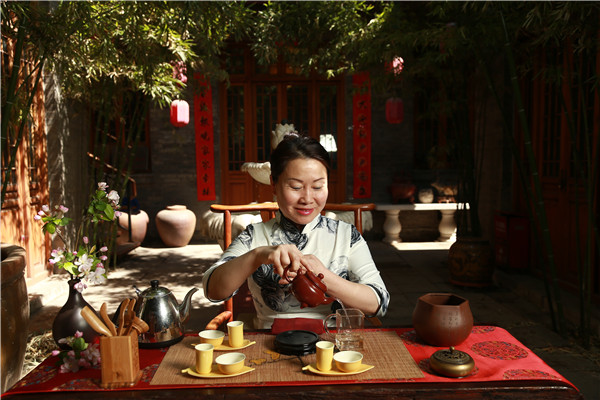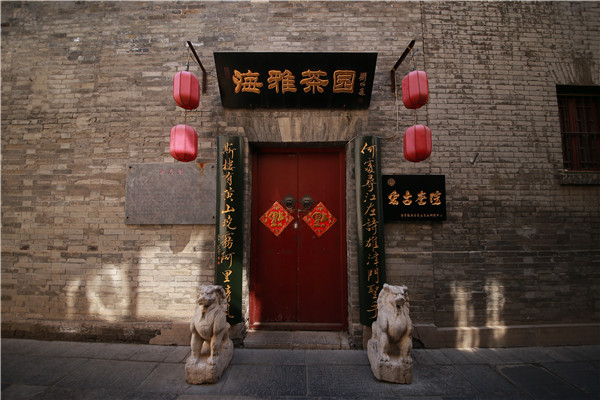Time for tea in Tianjin

Chen Yuzhen
Coffee may have found a place in China, but tea still reigns as Emperor in the East. One Tianjin woman has dedicated herself to mastering the art of holding a Chinese tea ceremony. Rose kindly took the time to share some insights on why tea is so important in Chinese culture and how we can avoid being cheating when it comes to buying it.
JIN: Please introduce yourself.
RC: My name is Rose Chen (陈玉珍 Chén Yùzhēn). In 2000 I started looking into traditional Chinese tea culture. I have obtained three different national level certifications and currently hold several positions related to the tea industry, such as managing and teaching at a tea training school. In addition, during a number of Davos events I have held Chinese tea ceremonies and entertained foreign guests from around the world introducing tea culture to them. I also conduct tea trainings at various banks and companies throughout Tianjin.
JIN: Why did you choose to become a tea artist?
RC: A tea artist has the unique opportunity to promote China's 5,000-year history. The role also promotes good health and can involve nearly every industry.
JIN: Did your parents support such a choice?
RC: Yes.
JIN: Coffee is very popular. Why stick with being a tea artist?
RC: Coffee and tea represent different cultures. Coffee is a stimulant. Tea on the other hand can have medicinal value, balancing the body. It can positively affect both the mind and body.
JIN: Like wine, many teas are too expensive for most to buy. How do you see this? Are these teas worth it?
RC: Tea being so expensive is normal. Each time tea is brewed, only about 3-5 grams are needed. This means 500 grams of a good tea isn't really that much. Fine tea is grown in specific locations with good water and air. It is then prepared by a tea craftsman. With tea you get what you pay for.
JIN: How should tea be selected? Is it better to buy big brands or those less famous?
RC: Consumers must buy the big brand teas. These are safe to drink and grown in designated tea regions. Tea sold by smaller vendors have more unknowns and could even have harmful effects on the body.
JIN: What suggestions do you have for saving money and avoiding getting conned when buying tea?
RC: Choose well-known reputable brands being sold at established tea shops. This is the best option for avoiding scams and buying tea that is safe to drink.
JIN: Why is tea so important in Chinese culture?
RC: Tea has been a part of Chinese culture for more than 5,000 years. From ancient times it has served not only as a drink but even medicine. It is a part of every Chinese household.
JIN: How do you see the future of tea?
RC: Chinese tea culture has already been introduced to the world. The future is limitless.

Ms. Chen's tea school
Expats arriving in China will encounter a strong tea culture. For example, it seems like nearly everyone carries around a thermos. Unlike overseas, in Tianjin that thermos usually has either hot water or hot tea in it, but not coffee. And yes, that is true all year round, regardless of how hot it is outside. For further information on why in the world the Chinese are so dedicated to drinking hot beverages, see this month's culture column.
In Tianjin a favorite tea is Jasmine Tea (茉莉花茶 mòlihuāchá). As with most teas, the price for it can vary widely. Most expats probably don't have a trustworthy "tea supplier." Therefore, as Rose suggested, buy big brand teas at reputable stores. Tianjin has Tea markets. These places have room after room of private sellers offering all kinds of tea. The biggest issue with these places is confirming exactly what is being bought.
Some say to drink red tea (红茶 hóngchá) in winter and green tea (绿茶 lǚchá) in summer. This is because allegedly green tea and fermented teas like Pu'er (普洱茶 Pǔ’ěr chá) cause an increase of "fire" in the body. This is where as Rose talked about, teas can cross the line into medicine. According to Chinese medicine, the goal is to maintain balance within the body and what we drink plays a big part in this. Which is why season and health status should be considered when buying tea. Some teas may have caffeine and affect sleep much like coffee does.
Rose runs a school for training people in the art of holding a tea ceremony. It is quite a ritual. For an idea on what happens during one, search online for videos using the key words "Chinese tea ceremony." Expats looking to learn about tea, improve their Chinese, or understand local culture better can attend a local ceremony. However, be aware those overly concerned with hygiene may get squeamish. In some cases, the cups used during a tea ceremony don't get fully washed. The most common techniques for "washing" tools tend to be pouring boiling water over them, dipping them in boiling water, or partially submersing them in boiling water. Another aspect of attending a tea ceremony is the potential responsibility to buy tea. The workers at local shops tend to be very willing to hold a tea tasting ceremony for guests, especially expats, to introduce different teas. However, that happy mood and broad smile can change quickly if one attempts to leave without buying anything. On a final note, another reason to follow Rose’s advice and stick to visiting reliable tea shops is a scam consisting of a pretty girl inviting an expat for tea or drinks. Eventually the guest is forced to pay a hefty bill or else face dire consequences. JIN thanks Rose for taking the time to explain Tianjin's tea culture and provide tips to keep expats safe.

Copyright © Tianjin Municipal Government.
All rights reserved. Presented by China Daily.
京ICP备13028878号-35



